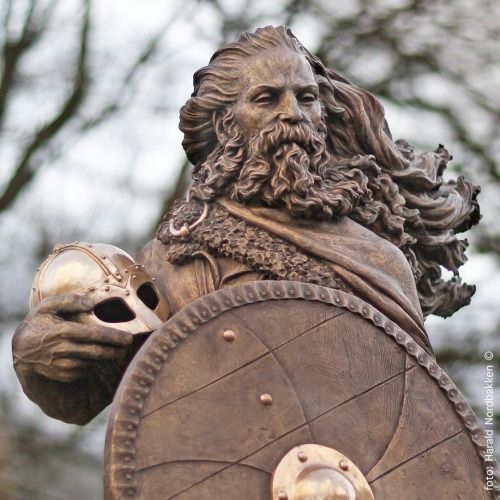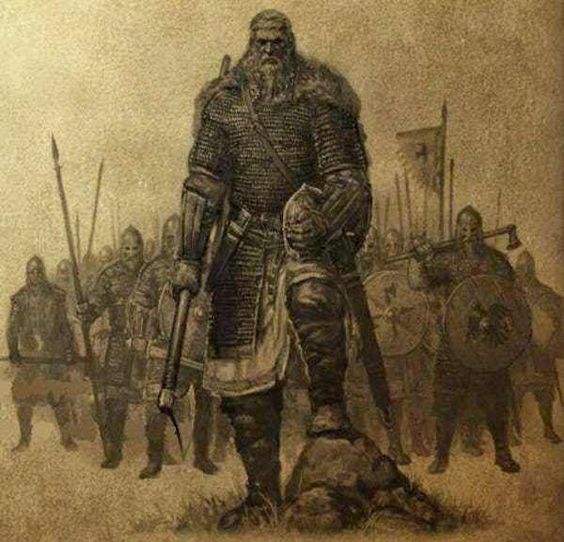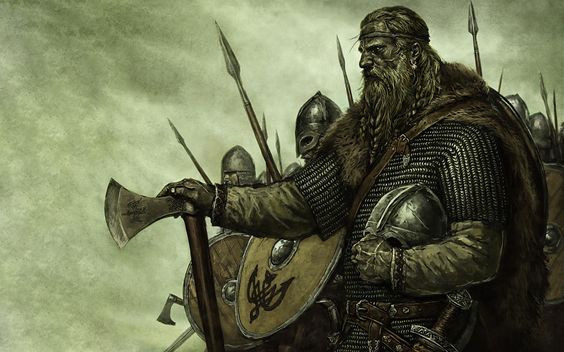
the first King of Norway - Harald Hårfagre - Statue by Frode Mikal Lillesund
HARALD IS KING
Now when Harald was ten years old his father, King Halfdan, died. An old book that tells about Harald says that then "he was the biggest of all men, the strongest, and the fairest to look upon." That about a boy ten years old! But boys grew fast in those days for they were out of doors all the time, running, swimming, leaping on skees, and hunting in the forest. All that makes big, manly boys.
So now King Halfdan was dead and buried, and Harald was to be king. But first he must drink his father's funeral ale.
"Take down the gay tapestries that hang in the feast hall," he said to the thralls. "Put up black and gray ones. Strew the floor with pine branches. Brew twenty tubs of fresh ale and mead. Scour every dish until it shines."
Then Harald sent messengers all over that country to his kinsmen and friends.
"Bid them come in three months' time to drink my father's funeral ale," he said. "Tell them that no one shall go away empty-handed."
So in three months men came riding up at every hour. Some came in boats. But many had ridden far through mountains, swimming rivers; for there were few roads or bridges in Norway. On account of that hard ride no women came to the feast.
At nine o'clock in the night the feast began. The men came walking in at the west end of the hall. The great bonfires down the middle of the room were flashing light on everything. The clean smell of this wood-smoke and of the pine branches on the floor was pleasant to the guests. Down each side of the hall stretched long, backless benches, with room for three hundred men. In the middle of each side rose the high seat, a great carved chair on a platform. All along behind the benches were the black and gray draperies. Here hung the shields of the guests; for every man, when he was given his place, turned and hung his shield behind him and set his tall spear by it. So on each wall there was a long row of gay shields, red and green and yellow, and all shining with gold or bronze trimmings. And higher up there was another row of gleaming spear-points. Above the hall the rafters were carved and gaily painted, so that dragons seemed to be crawling across, or eagles seemed to be swooping down.
The guests walked in laughing and talking with their big voices so that the rafters rang. They made the hall look all the brighter with their clothes of scarlet and blue and green, with their flashing golden bracelets and head-bands and sword-scabbards, with their flying hair of red or yellow.
Across the east end of the hall was a bench. When the men were all in, the queen, Harald's mother, and the women who lived with her, walked in through the east door and sat upon this bench.
Then thralls came running in and set up the long tables before the benches. Other thralls ran in with large steaming kettles of meat. They put big pieces of this meat into platters of wood and set it before the men. They had a few dishes of silver. These they put before the guests at the middle of the tables; for the great people sat here near the high seats.
When the meat came, the talking stopped; for Norsemen ate only twice a day, and these men had had long rides and were hungry. Three or four persons ate from one platter and drank from the same big bowl of milk. They had no forks, so they ate from their fingers and threw the bones under the table among the pine branches. Sometimes they took knives from their belts to cut the meat.
When the guests sat back satisfied, Harald called to the thralls:
"Carry out the tables."
So they did and brought in two great tubs of mead and set one at each end of the hall. Then the queen stood up and called some of her women. They went to the mead tubs. They took the horns, when the thralls had filled them, and carried them to the men with some merry word. Perhaps one woman said as she handed a man his horn:[57]
"This horn has no feet to be set down upon. You must drink it at one draught."
Perhaps another said:
"Mead loves a merry face."
The women were beautiful, moving about the hall. The queen wore a trailing dress of blue velvet with long flowing sleeves. She had a short apron of striped Arabian silk with gold fringe along the bottom. From her shoulders hung a long train of scarlet wool embroidered in gold. White linen covered her head. Her long yellow hair was pulled around at the sides and over her breast and was fastened under the belt of her apron. As she walked, her train made a pleasant rustle among the pine branches. She was tall and straight and strong. Some of her younger women wore no linen on their heads and had their white arms bare, with bracelets shining on them. They, too, were tall and strong.
All the time men were calling across the fire to one another asking news or telling jokes and laughing.
An old man, Harald's uncle, sat in the high seat on the north side. That was[58] the place of honor. But the high seat on the south side was empty; for that was the king's seat. Harald sat on the steps before it.
The feast went merrily until long after midnight. Then the thralls took some of the guests to the guest house to sleep, and some to the beds around the sides of the feast hall. But some men lay down on the benches and drew their cloaks over themselves.
On the next night there was another feast. Still Harald sat on the step before the high seat. But when the tables were gone and the horns were going around, he stood up and raised high a horn of ale and said loudly:
"This horn of memory I drink in honor of my father, Halfdan, son of Gudrod, who sits now in Valhalla. And I vow that I will grind my father's foes under my heel."
Then he drank the ale and sat down in the king's high seat, while all the men stood up and raised their horns and shouted:
"King Harald!"
And some cried:
"That was a brave vow."
[60]And Harald's uncle called out:
"A health to King Harald!"
And they all drank it.
Then a man stood up and said:
"Hear my song of King Halfdan!" for this man was a skald.
"Yes, the song!" shouted the men, and Harald nodded his head.
So the skald took down his great harp from the wall behind him and went and stood before Harald. The bottom of the harp rested on the floor, but the top reached as high as the skald's shoulders. The brass frame shone in the light. The strings were some of gold and some of silver. The man struck them with his hand and sang of King Halfdan, of his battles, of his strong arm and good sword, of his death, and of how men loved him.
When he had finished, King Harald took a bracelet from his arm and gave it to him, saying:
"Take this as thanks for your good song."
The guests stayed the next day and at night there was another feast. When[61] the mead horns were going around, King Harald stood up and spoke:
"I said that no man should go away empty-handed from drinking my father's funeral ale."
He beckoned the thralls, and they brought in a great treasure-chest and set it down by the high seat. King Harald opened it and took out rich gifts capes and sword belts and beautiful cloth and bracelets and gold cloak-pins. These he sent about the hall and gave something to every man. The guests wondered at the richness of his gifts.
"This young king has an open hand," they said, "and deep treasure-chests."
After breakfast the next morning the guests went out and stood by their horses ready to go, but before they mounted, thralls brought a horn of mead to each man. That was called the stirrup-horn, because after they drank it the men put their feet to the stirrups and sprang upon their horses and started. King Harald and his people rode a little way with them.
All men said that that was the richest funeral feast that ever was held.

HARALD'S BATTLE
Now King Halfdan had many foes. When he was alive they were afraid to make war upon him, for he was a mighty warrior. But when Harald became king, they said:
"He is but a lad. We will fight with him and take his land."
So they began to make ready. King Harald heard of this and he laughed and said:
"Good! 'Foes'-fear' is thirsty, and my legs are stiff with much sitting."
He called three men to him. To one he gave an arrow, saying:
"Run and carry this arrow north. Give it into the hands of the master of the next farm, and say that all men are to meet here within two weeks from this day. They must come ready for war and mounted on horses. Say also that if a man does not obey this call, or if he receives this arrow and does not carry it on to his next neighbor, he shall be outlawed from this country, and his land shall be taken from him."
He gave arrows to the other two men and told them to run south and east with the same message.
So all through King Harald's country men were soon busy mending helmets and polishing swords and making shields. There was blazing of forges and clanging of anvils all through the land.
On the day set, the fields about King Harald's house were full of men and horses. After breakfast a horn blew. Every man snatched his weapons and jumped upon his horse. Men of the same neighborhood stood together, and their chief led them. They waited for the starting horn. This did not look like our army. There were no uniforms. Some men wore helmets, some did not. Some wore coats of mail, but others wore only their jackets and tights of bright-colored wool. But at each man's left side hung a great shield. Over his right shoulder went his sword-belt and held his long sword under his left hand. Above most men's heads shone the points of their tall spears. Some men carried axes in their belts. Some carried bows and arrows. Many had ram's horns hanging from their necks.
King Harald rode at the front of his army with his standard-bearer beside him. Chain-armor covered the king's body. A red cloak was thrown over his shoulders. On his head was a gold helmet with a dragon standing up from it. He carried a round shield on his left arm. The king had made that shield himself. It was of brass. The rivets were of silver, with strangely shaped heads. On the back of Harald's horse was a red cloth trimmed with the fur of ermine.
King Harald looked up at his standard and laughed aloud.
"Oh, War-lover," he cried, "you and I ride out on a gay journey."
A horn blew again and the army started. The men shouted as they went, and blew their ram's horns.
"Now we shall taste something better than even King Harald's ale," shouted one.
Another rose in his stirrups and sniffed the air.
"Ah! I smell a battle," he cried. "It is sweeter than those strange waters of Arabia."
So the army went merrily through the land. They carried no tents, they had no provision wagons.
"The sky is a good enough tent for a soldier," said the Norsemen. "Why carry provisions when they lie in the farms beside you?"
After two days King Harald saw another army on the hills.
"Thorstein," he shouted, "up with the white shield and go tell King Haki to choose his battle-field. We will wait but an hour. I am eager for the frolic."
So Thorstein raised a white shield on his spear as a sign that he came on an errand of peace. He rode near King Haki, but he could not wait until he came close before he shouted out his message and then turned and rode back.
"Tell your boy king that we will not hang back," Haki called after Thorstein.
King Harald's men waited on the hillside and watched the other army across the valley. They saw King Haki point and saw twenty men ride off as he pointed. They stopped in a patch of hazel and hewed with their axes.
"They are getting the hazels," said Thorstein.
"Audun," said King Harald to a man near him, "stay close to my standard all day. You must see the best of the fight. I want to hear a song about it after it is over."
This Audun was the skald who sang at the drinking of King Halfdan's funeral ale.
King Haki's men rode down into the valley. They drove down stakes all about a great field. They tied the hazel twigs to the stakes in a string. But they left an open space toward King Harald's army and one toward King Haki's. Then a man raised a white shield and galloped toward King Harald.
"We are ready!" he shouted.
At the same time King Haki raised a red shield. King Harald's men put their shields before their mouths and shouted into them. It made a great roaring war-cry.
"Up with the war shield!" shouted King Harald. "Horns blow!"
There was a blowing of horns on both sides. The two armies galloped down into the field and ran together. The fight had begun.
All that day long swords were flashing, spears flying, men shouting, men falling from their horses, swords clashing against shields.
"Victory flashes from that dragon," Harald's men said, pointing to the king's helmet. "No one stands before it."
And, surely, before night came, King Haki fell dead under "Foes'-fear." When he fell, a great shout went up from his warriors, and they turned and fled. King Harald's men chased them far, but during the night came back to camp. Many brought swords and helmets and bracelets or silver-trimmed saddles and bridles with them.
"Here is what we got from the foe," they said.
The next morning King Harald spoke to his men:
"Let us go about and find our dead."
So they went over all the battlefield. They put every man on his shield and carried him and laid him on a hill-top. They hung his sword over his shoulder and laid his spear by his side. So they laid all the dead together there on the hill-top. Then King Harald said, looking about:
"This is a good place to lie. It looks far over the country. The sound of the sea reaches it. The wind sweeps here. It is a good grave for Norsemen and Vikings. But it is a long road and a rough road to Valhalla that these men must travel. Let the nearest kinsman of each man come and tie on his hell-shoes. Tie them fast, for they will need them much on that hard road."
So friends tied shoes on the dead men's feet. Then King Harald said:
"Now let us make the mound."
Every man set to work with what tools he had and heaped earth over the dead until a great mound stood up. They piled stones on the top. On one of these stones King Harald made runes telling how these men had died.
After that was done King Harald said:
"Now set up the pole, Thorstein. Let every man bring to that pole all that he took from the foe."
So they did, and there was a great hill of things around it. Harald divided it into piles.
"This pile we will give to Thor in thanks for the victory," he said. "This pile is mine because I am king. Here are the piles for the chiefs, and these things go to the other men of the army."
So every man went away from that battle richer than he was before, and Thor looked down from Valhalla upon his full temple and was pleased.
The next morning King Harald led his army back. But on the way he met other foes and had many battles and did not lose one. The kings either died in battle or ran away, and Harald had their lands.
"He has kept his vow," men said, "and ground his father's foes under his heel."
So King Harald sat in peace for a while.

